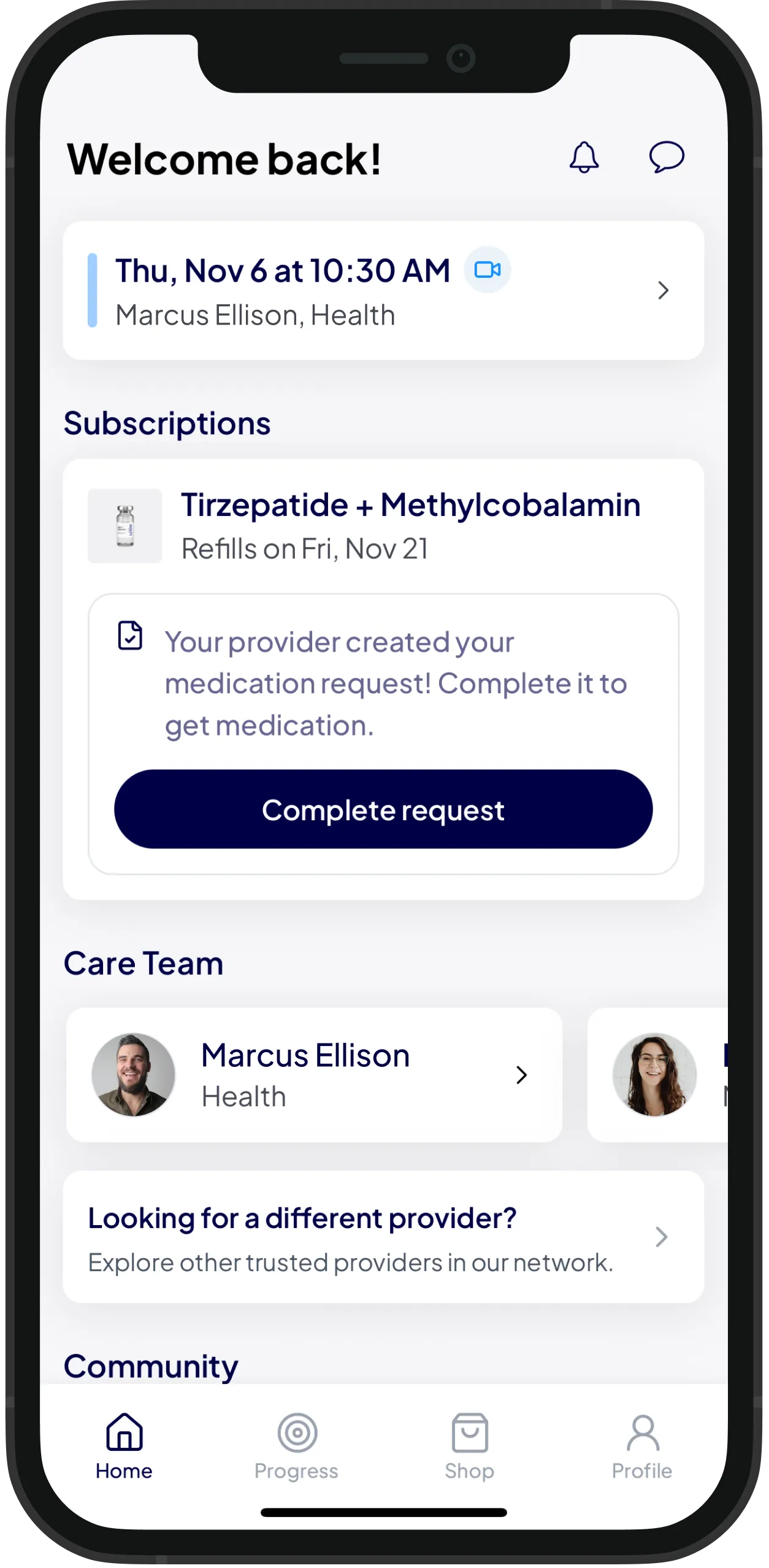Ready to transform your health?
Unlock access to expert guidance and a weight care plan crafted just for you.
Ready to transform your health?
Unlock access to expert guidance and a weight care plan crafted just for you.
Similar Articles
Similar Articles


GLP-1s for Athletes: Performance, Body Composition, and Recovery
GLP-1s for Athletes: Performance, Body Composition, and Recovery


What Labs Should You Monitor on GLP-1s? A Complete Biomarker Guide
What Labs Should You Monitor on GLP-1s? A Complete Biomarker Guide


Does Semaglutide Affect Fertility or Pregnancy?
Does Semaglutide Affect Fertility or Pregnancy?
Does Estradiol Cause Weight Gain?
Does Estradiol Cause Weight Gain?
Does Estradiol Cause Weight Gain?
If you’re experiencing unexpected weight gain, an underlying hormonal imbalance may be to blame. Here’s a breakdown of the signs, risk factors, and preventative steps you can take if your estradiol levels are out of balance.
If you’re experiencing unexpected weight gain, an underlying hormonal imbalance may be to blame. Here’s a breakdown of the signs, risk factors, and preventative steps you can take if your estradiol levels are out of balance.
If you’re experiencing unexpected weight gain, an underlying hormonal imbalance may be to blame. Here’s a breakdown of the signs, risk factors, and preventative steps you can take if your estradiol levels are out of balance.



Table of Contents
Table of Contents
Table of Contents
What Is Estradiol and What Causes It To Fluctuate?
Signs of Hormonal Imbalances
What Causes Hormonal Imbalances?
How Do Estradiol Levels Impact Weight Gain?
How Is Hormonal Weight Gain Diagnosed?
What Are the Risks of Untreated Hormonal Weight Gain?
Can You Treat Low Estrogen?
Key Takeaways
What Is Estradiol and What Causes It To Fluctuate?
Signs of Hormonal Imbalances
What Causes Hormonal Imbalances?
How Do Estradiol Levels Impact Weight Gain?
How Is Hormonal Weight Gain Diagnosed?
What Are the Risks of Untreated Hormonal Weight Gain?
Can You Treat Low Estrogen?
Key Takeaways
What Is Estradiol and What Causes It To Fluctuate?
Signs of Hormonal Imbalances
What Causes Hormonal Imbalances?
How Do Estradiol Levels Impact Weight Gain?
How Is Hormonal Weight Gain Diagnosed?
What Are the Risks of Untreated Hormonal Weight Gain?
Can You Treat Low Estrogen?
Key Takeaways
If you’re approaching the age range of menopause or are already in it, your body has likely started showing signs of major hormonal shifts. This typically happens for women between age 45-55 and can last 7 to up to 14 years depending on health, lifestyle, and genetic factors (1). From mood swings to hot flashes, there are many frustrating challenges that come with menopause. For many, weight gain is at the top of the list.
Your suspicions are true – hormones do play a role in body weight and fluctuate greatly when menopause hits. Imbalances in estrogen, and particularly a decline in estradiol, are known to lead to weight gain (2). Here’s what you need to know about keeping estrogen in check and whether your unexpected weight gain is connected to your hormone levels.
What Is Estradiol and What Causes It To Fluctuate?
Estradiol is a form of estrogen, an essential hormone produced during a woman’s reproductive years from puberty until menopause. Estrogen plays a key role in menstruation cycles, ovulation, and preparing the uterus for pregnancy. It’s important to understand that estrogen fluctuates normally throughout your lifetime. The body makes three different types of estrogen (3):
Estradiol: The primary, and most potent, form of estrogen produced by your body during reproductive years
Estriol: The form of estrogen that is ramped up during pregnancy
Estrone: The primary form of estrogen produced by your body after menopause
Signs of Hormonal Imbalances
Hormones play a crucial role in your overall health. When they fall out of balance, a wide range of functions are impacted, which is why symptoms vary greatly. Estrogen is just one of many different types of hormones that all work in synchronicity to keep your body functioning at its best.
When a hormonal imbalance occurs, it can be difficult to detect and diagnose since there is no single tell-tale sign. Common, yet nonspecific, signs you may be experiencing a hormonal imbalance include:
Weight gain or difficulty losing weight (one of the most common signs)
Feeling sleepy and fatigued all the time
Mood swings
Depression
Low sex drive
Vaginal dryness or irritation (possibly leading to painful sex)
Hot flashes
Irregular periods or absence of periods
Breast tenderness
Excessive hair growth (especially facial and arms)
Difficulty sleeping throughout the night or falling asleep
Brain fog
Headaches or migraines
Skin problems such as dry skin or acne
Constipation
Digestive problems
The above symptoms can be a sign of a hormonal imbalance, but may also be a sign of something more serious. It’s always a good idea to communicate with your provider if you’re experiencing any of them.
What Causes Hormonal Imbalances?
While there are many possible causes of hormonal imbalance, the following are some of the most common:
Obesity
Long-term stress
Diabetes
Thyroid dysfunction (hyper- or hypothyroidism)
Polycystic Ovarian Syndrome
Menstruation
Pregnancy, childbirth, and breastfeeding
Perimenopause, menopause, and postmenopause
Certain medications (i.e., thyroid or certain diabetes medications)
Autoimmune conditions
Birth control medications
Eating disorders such as anorexia
How Do Estradiol Levels Impact Weight Gain?
Estradiol naturally decreases during menopause. As one of estradiol’s main functions is to help regulate metabolism and body weight, lower levels of estradiol may therefore lead to weight gain (4).
According to one study, menopausal women are 3x more likely to develop obesity than premenopausal women (5).
How Is Hormonal Weight Gain Diagnosed?
Your provider can help you determine if your weight gain is due to a hormonal imbalance. They will perform a physical exam and ask questions about your overall health to understand the root cause better.
Various factors, including age, family history, your described symptoms, and physical exam, can help you decide whether further testing is necessary and, if so, which ones you should pursue. A typical starting place is to get an updated blood sample and review your latest lab values regarding your hormones, cholesterol, and blood sugar. This is to screen for hormonal imbalances and your risk for high cholesterol and diabetes. Your provider may suggest further testing involving imaging or more invasive tests depending on what they think is the driving force behind your specific set of symptoms.
What Are the Risks of Untreated Hormonal Weight Gain?
The risks of untreated hormonal weight gain can vary depending on which hormonal imbalance contributes to your weight gain. For example, polycystic ovarian syndrome (PCOS) is commonly associated with weight gain and if left untreated, can lead to infertility.
There are a number of risks associated with any weight gain that leads to obesity. Being overweight (BMI >25) or obese (BMI >30) is linked to the development of conditions such as type 2 diabetes, high blood pressure, high cholesterol, non-alcoholic fatty liver disease, obstructive sleep apnea, heart disease, and stroke (6).
Can You Treat Low Estrogen?
Women in menopause who are suffering from low estrogen levels may benefit from hormone replacement therapy (HRT). For women who are at higher risk for breast cancer or forming blood clots, non-hormonal treatments are preferred.
HRT is commonly prescribed for women in menopause or perimenopause, which is the period leading up to menopause when your ovaries gradually stop working. HRT helps replenish hormones such as estrogen and progesterone, both of which naturally decrease with age. These hormones dip more dramatically around menopause and can cause some unpleasant yet common symptoms such as hot flashes, mood swings, vaginal dryness, and weight gain.
HRT can help treat symptoms related to low estrogen and progesterone either in the form of a pill, patch, cream, gel, or injectables. Your provider can help you decide if estrogen or a combination estrogen-progesterone replacement plan is right for you.
Estrogen replacement can help manage your hormonal imbalances while also reducing the risk of bone fractures and developing heart disease. Your provider will likely try to get you on the lowest effective dose to minimize the risks that come along with HRT, such as blood clots and stroke.
For those with obesity, weight loss can be crucial to manage the hormonal fluctuations during menopause. GLP-1 RA medications, such as semaglutide and tirzepatide, can be effective solutions. These medications target hormones controlling appetite and blood sugar to promote weight loss. Women at the perimenopausal or menopausal stage can benefit greatly from exploring these options if they meet the following criteria:
BMI over 30
BMI over 27 with a weight-related health condition such as diabetes, high blood pressure, or high cholesterol
Key Takeaways
Low estrogen levels, especially estradiol, can increase your risk of weight gain, osteoporosis, and heart disease. Talk with your provider to see if low estrogen levels may be contributing to your weight gain, especially if you’re nearing or at the age of menopause. There are a few therapeutic options available to help you manage your weight during menopause, including hormone replacement therapy and GLP-1 weight loss medications for those who need a more intensive weight loss management solution.
If you’re interested in exploring your options for medication-assisted weight loss, Mochi Health can help you access affordable, holistic care. The program offers 1-on-1 provider support from licensed physicians, 24/7 customer support, direct provider messaging, and medications delivered to your door. Find out if you’re eligible today.
Sources
Gold, E. B. (2011). The Timing of the Age at Which Natural Menopause Occurs. Obstetrics and Gynecology Clinics of North America, 38(3), 425. https://doi.org/10.1016/j.ogc.2011.05.002
Vigil, P., Meléndez, J., Petkovic, G., & Del Río, J. P. (2022). The importance of estradiol for body weight regulation in women. Frontiers in endocrinology, 13, 951186. https://doi.org/10.3389/fendo.2022.951186
Hariri, L. (2023a, June 28). Estradiol. StatPearls [Internet]. https://www.ncbi.nlm.nih.gov/books/NBK549797/
Lizcano, F., & Guzmán, G. (2014). Estrogen Deficiency and the Origin of Obesity during Menopause. BioMed research international, 2014, 757461. https://doi.org/10.1155/2014/757461
Eshtiaghi R, Esteghamati A, Nakhjavani M. Menopause is an independent predictor of metabolic syndrome in Iranian women. Maturitas. 2010;65(3):262–266. https://www.sciencedirect.com/science/article/abs/pii/S0378512209004034
Lim Y, Boster J. Obesity and Comorbid Conditions. [Updated 2023 Aug 28]. In: StatPearls [Internet]. Treasure Island (FL): StatPearls Publishing; 2024 Jan-. Available from: https://www.ncbi.nlm.nih.gov/books/NBK574535/#
If you’re approaching the age range of menopause or are already in it, your body has likely started showing signs of major hormonal shifts. This typically happens for women between age 45-55 and can last 7 to up to 14 years depending on health, lifestyle, and genetic factors (1). From mood swings to hot flashes, there are many frustrating challenges that come with menopause. For many, weight gain is at the top of the list.
Your suspicions are true – hormones do play a role in body weight and fluctuate greatly when menopause hits. Imbalances in estrogen, and particularly a decline in estradiol, are known to lead to weight gain (2). Here’s what you need to know about keeping estrogen in check and whether your unexpected weight gain is connected to your hormone levels.
What Is Estradiol and What Causes It To Fluctuate?
Estradiol is a form of estrogen, an essential hormone produced during a woman’s reproductive years from puberty until menopause. Estrogen plays a key role in menstruation cycles, ovulation, and preparing the uterus for pregnancy. It’s important to understand that estrogen fluctuates normally throughout your lifetime. The body makes three different types of estrogen (3):
Estradiol: The primary, and most potent, form of estrogen produced by your body during reproductive years
Estriol: The form of estrogen that is ramped up during pregnancy
Estrone: The primary form of estrogen produced by your body after menopause
Signs of Hormonal Imbalances
Hormones play a crucial role in your overall health. When they fall out of balance, a wide range of functions are impacted, which is why symptoms vary greatly. Estrogen is just one of many different types of hormones that all work in synchronicity to keep your body functioning at its best.
When a hormonal imbalance occurs, it can be difficult to detect and diagnose since there is no single tell-tale sign. Common, yet nonspecific, signs you may be experiencing a hormonal imbalance include:
Weight gain or difficulty losing weight (one of the most common signs)
Feeling sleepy and fatigued all the time
Mood swings
Depression
Low sex drive
Vaginal dryness or irritation (possibly leading to painful sex)
Hot flashes
Irregular periods or absence of periods
Breast tenderness
Excessive hair growth (especially facial and arms)
Difficulty sleeping throughout the night or falling asleep
Brain fog
Headaches or migraines
Skin problems such as dry skin or acne
Constipation
Digestive problems
The above symptoms can be a sign of a hormonal imbalance, but may also be a sign of something more serious. It’s always a good idea to communicate with your provider if you’re experiencing any of them.
What Causes Hormonal Imbalances?
While there are many possible causes of hormonal imbalance, the following are some of the most common:
Obesity
Long-term stress
Diabetes
Thyroid dysfunction (hyper- or hypothyroidism)
Polycystic Ovarian Syndrome
Menstruation
Pregnancy, childbirth, and breastfeeding
Perimenopause, menopause, and postmenopause
Certain medications (i.e., thyroid or certain diabetes medications)
Autoimmune conditions
Birth control medications
Eating disorders such as anorexia
How Do Estradiol Levels Impact Weight Gain?
Estradiol naturally decreases during menopause. As one of estradiol’s main functions is to help regulate metabolism and body weight, lower levels of estradiol may therefore lead to weight gain (4).
According to one study, menopausal women are 3x more likely to develop obesity than premenopausal women (5).
How Is Hormonal Weight Gain Diagnosed?
Your provider can help you determine if your weight gain is due to a hormonal imbalance. They will perform a physical exam and ask questions about your overall health to understand the root cause better.
Various factors, including age, family history, your described symptoms, and physical exam, can help you decide whether further testing is necessary and, if so, which ones you should pursue. A typical starting place is to get an updated blood sample and review your latest lab values regarding your hormones, cholesterol, and blood sugar. This is to screen for hormonal imbalances and your risk for high cholesterol and diabetes. Your provider may suggest further testing involving imaging or more invasive tests depending on what they think is the driving force behind your specific set of symptoms.
What Are the Risks of Untreated Hormonal Weight Gain?
The risks of untreated hormonal weight gain can vary depending on which hormonal imbalance contributes to your weight gain. For example, polycystic ovarian syndrome (PCOS) is commonly associated with weight gain and if left untreated, can lead to infertility.
There are a number of risks associated with any weight gain that leads to obesity. Being overweight (BMI >25) or obese (BMI >30) is linked to the development of conditions such as type 2 diabetes, high blood pressure, high cholesterol, non-alcoholic fatty liver disease, obstructive sleep apnea, heart disease, and stroke (6).
Can You Treat Low Estrogen?
Women in menopause who are suffering from low estrogen levels may benefit from hormone replacement therapy (HRT). For women who are at higher risk for breast cancer or forming blood clots, non-hormonal treatments are preferred.
HRT is commonly prescribed for women in menopause or perimenopause, which is the period leading up to menopause when your ovaries gradually stop working. HRT helps replenish hormones such as estrogen and progesterone, both of which naturally decrease with age. These hormones dip more dramatically around menopause and can cause some unpleasant yet common symptoms such as hot flashes, mood swings, vaginal dryness, and weight gain.
HRT can help treat symptoms related to low estrogen and progesterone either in the form of a pill, patch, cream, gel, or injectables. Your provider can help you decide if estrogen or a combination estrogen-progesterone replacement plan is right for you.
Estrogen replacement can help manage your hormonal imbalances while also reducing the risk of bone fractures and developing heart disease. Your provider will likely try to get you on the lowest effective dose to minimize the risks that come along with HRT, such as blood clots and stroke.
For those with obesity, weight loss can be crucial to manage the hormonal fluctuations during menopause. GLP-1 RA medications, such as semaglutide and tirzepatide, can be effective solutions. These medications target hormones controlling appetite and blood sugar to promote weight loss. Women at the perimenopausal or menopausal stage can benefit greatly from exploring these options if they meet the following criteria:
BMI over 30
BMI over 27 with a weight-related health condition such as diabetes, high blood pressure, or high cholesterol
Key Takeaways
Low estrogen levels, especially estradiol, can increase your risk of weight gain, osteoporosis, and heart disease. Talk with your provider to see if low estrogen levels may be contributing to your weight gain, especially if you’re nearing or at the age of menopause. There are a few therapeutic options available to help you manage your weight during menopause, including hormone replacement therapy and GLP-1 weight loss medications for those who need a more intensive weight loss management solution.
If you’re interested in exploring your options for medication-assisted weight loss, Mochi Health can help you access affordable, holistic care. The program offers 1-on-1 provider support from licensed physicians, 24/7 customer support, direct provider messaging, and medications delivered to your door. Find out if you’re eligible today.
Sources
Gold, E. B. (2011). The Timing of the Age at Which Natural Menopause Occurs. Obstetrics and Gynecology Clinics of North America, 38(3), 425. https://doi.org/10.1016/j.ogc.2011.05.002
Vigil, P., Meléndez, J., Petkovic, G., & Del Río, J. P. (2022). The importance of estradiol for body weight regulation in women. Frontiers in endocrinology, 13, 951186. https://doi.org/10.3389/fendo.2022.951186
Hariri, L. (2023a, June 28). Estradiol. StatPearls [Internet]. https://www.ncbi.nlm.nih.gov/books/NBK549797/
Lizcano, F., & Guzmán, G. (2014). Estrogen Deficiency and the Origin of Obesity during Menopause. BioMed research international, 2014, 757461. https://doi.org/10.1155/2014/757461
Eshtiaghi R, Esteghamati A, Nakhjavani M. Menopause is an independent predictor of metabolic syndrome in Iranian women. Maturitas. 2010;65(3):262–266. https://www.sciencedirect.com/science/article/abs/pii/S0378512209004034
Lim Y, Boster J. Obesity and Comorbid Conditions. [Updated 2023 Aug 28]. In: StatPearls [Internet]. Treasure Island (FL): StatPearls Publishing; 2024 Jan-. Available from: https://www.ncbi.nlm.nih.gov/books/NBK574535/#
If you’re approaching the age range of menopause or are already in it, your body has likely started showing signs of major hormonal shifts. This typically happens for women between age 45-55 and can last 7 to up to 14 years depending on health, lifestyle, and genetic factors (1). From mood swings to hot flashes, there are many frustrating challenges that come with menopause. For many, weight gain is at the top of the list.
Your suspicions are true – hormones do play a role in body weight and fluctuate greatly when menopause hits. Imbalances in estrogen, and particularly a decline in estradiol, are known to lead to weight gain (2). Here’s what you need to know about keeping estrogen in check and whether your unexpected weight gain is connected to your hormone levels.
What Is Estradiol and What Causes It To Fluctuate?
Estradiol is a form of estrogen, an essential hormone produced during a woman’s reproductive years from puberty until menopause. Estrogen plays a key role in menstruation cycles, ovulation, and preparing the uterus for pregnancy. It’s important to understand that estrogen fluctuates normally throughout your lifetime. The body makes three different types of estrogen (3):
Estradiol: The primary, and most potent, form of estrogen produced by your body during reproductive years
Estriol: The form of estrogen that is ramped up during pregnancy
Estrone: The primary form of estrogen produced by your body after menopause
Signs of Hormonal Imbalances
Hormones play a crucial role in your overall health. When they fall out of balance, a wide range of functions are impacted, which is why symptoms vary greatly. Estrogen is just one of many different types of hormones that all work in synchronicity to keep your body functioning at its best.
When a hormonal imbalance occurs, it can be difficult to detect and diagnose since there is no single tell-tale sign. Common, yet nonspecific, signs you may be experiencing a hormonal imbalance include:
Weight gain or difficulty losing weight (one of the most common signs)
Feeling sleepy and fatigued all the time
Mood swings
Depression
Low sex drive
Vaginal dryness or irritation (possibly leading to painful sex)
Hot flashes
Irregular periods or absence of periods
Breast tenderness
Excessive hair growth (especially facial and arms)
Difficulty sleeping throughout the night or falling asleep
Brain fog
Headaches or migraines
Skin problems such as dry skin or acne
Constipation
Digestive problems
The above symptoms can be a sign of a hormonal imbalance, but may also be a sign of something more serious. It’s always a good idea to communicate with your provider if you’re experiencing any of them.
What Causes Hormonal Imbalances?
While there are many possible causes of hormonal imbalance, the following are some of the most common:
Obesity
Long-term stress
Diabetes
Thyroid dysfunction (hyper- or hypothyroidism)
Polycystic Ovarian Syndrome
Menstruation
Pregnancy, childbirth, and breastfeeding
Perimenopause, menopause, and postmenopause
Certain medications (i.e., thyroid or certain diabetes medications)
Autoimmune conditions
Birth control medications
Eating disorders such as anorexia
How Do Estradiol Levels Impact Weight Gain?
Estradiol naturally decreases during menopause. As one of estradiol’s main functions is to help regulate metabolism and body weight, lower levels of estradiol may therefore lead to weight gain (4).
According to one study, menopausal women are 3x more likely to develop obesity than premenopausal women (5).
How Is Hormonal Weight Gain Diagnosed?
Your provider can help you determine if your weight gain is due to a hormonal imbalance. They will perform a physical exam and ask questions about your overall health to understand the root cause better.
Various factors, including age, family history, your described symptoms, and physical exam, can help you decide whether further testing is necessary and, if so, which ones you should pursue. A typical starting place is to get an updated blood sample and review your latest lab values regarding your hormones, cholesterol, and blood sugar. This is to screen for hormonal imbalances and your risk for high cholesterol and diabetes. Your provider may suggest further testing involving imaging or more invasive tests depending on what they think is the driving force behind your specific set of symptoms.
What Are the Risks of Untreated Hormonal Weight Gain?
The risks of untreated hormonal weight gain can vary depending on which hormonal imbalance contributes to your weight gain. For example, polycystic ovarian syndrome (PCOS) is commonly associated with weight gain and if left untreated, can lead to infertility.
There are a number of risks associated with any weight gain that leads to obesity. Being overweight (BMI >25) or obese (BMI >30) is linked to the development of conditions such as type 2 diabetes, high blood pressure, high cholesterol, non-alcoholic fatty liver disease, obstructive sleep apnea, heart disease, and stroke (6).
Can You Treat Low Estrogen?
Women in menopause who are suffering from low estrogen levels may benefit from hormone replacement therapy (HRT). For women who are at higher risk for breast cancer or forming blood clots, non-hormonal treatments are preferred.
HRT is commonly prescribed for women in menopause or perimenopause, which is the period leading up to menopause when your ovaries gradually stop working. HRT helps replenish hormones such as estrogen and progesterone, both of which naturally decrease with age. These hormones dip more dramatically around menopause and can cause some unpleasant yet common symptoms such as hot flashes, mood swings, vaginal dryness, and weight gain.
HRT can help treat symptoms related to low estrogen and progesterone either in the form of a pill, patch, cream, gel, or injectables. Your provider can help you decide if estrogen or a combination estrogen-progesterone replacement plan is right for you.
Estrogen replacement can help manage your hormonal imbalances while also reducing the risk of bone fractures and developing heart disease. Your provider will likely try to get you on the lowest effective dose to minimize the risks that come along with HRT, such as blood clots and stroke.
For those with obesity, weight loss can be crucial to manage the hormonal fluctuations during menopause. GLP-1 RA medications, such as semaglutide and tirzepatide, can be effective solutions. These medications target hormones controlling appetite and blood sugar to promote weight loss. Women at the perimenopausal or menopausal stage can benefit greatly from exploring these options if they meet the following criteria:
BMI over 30
BMI over 27 with a weight-related health condition such as diabetes, high blood pressure, or high cholesterol
Key Takeaways
Low estrogen levels, especially estradiol, can increase your risk of weight gain, osteoporosis, and heart disease. Talk with your provider to see if low estrogen levels may be contributing to your weight gain, especially if you’re nearing or at the age of menopause. There are a few therapeutic options available to help you manage your weight during menopause, including hormone replacement therapy and GLP-1 weight loss medications for those who need a more intensive weight loss management solution.
If you’re interested in exploring your options for medication-assisted weight loss, Mochi Health can help you access affordable, holistic care. The program offers 1-on-1 provider support from licensed physicians, 24/7 customer support, direct provider messaging, and medications delivered to your door. Find out if you’re eligible today.
Sources
Gold, E. B. (2011). The Timing of the Age at Which Natural Menopause Occurs. Obstetrics and Gynecology Clinics of North America, 38(3), 425. https://doi.org/10.1016/j.ogc.2011.05.002
Vigil, P., Meléndez, J., Petkovic, G., & Del Río, J. P. (2022). The importance of estradiol for body weight regulation in women. Frontiers in endocrinology, 13, 951186. https://doi.org/10.3389/fendo.2022.951186
Hariri, L. (2023a, June 28). Estradiol. StatPearls [Internet]. https://www.ncbi.nlm.nih.gov/books/NBK549797/
Lizcano, F., & Guzmán, G. (2014). Estrogen Deficiency and the Origin of Obesity during Menopause. BioMed research international, 2014, 757461. https://doi.org/10.1155/2014/757461
Eshtiaghi R, Esteghamati A, Nakhjavani M. Menopause is an independent predictor of metabolic syndrome in Iranian women. Maturitas. 2010;65(3):262–266. https://www.sciencedirect.com/science/article/abs/pii/S0378512209004034
Lim Y, Boster J. Obesity and Comorbid Conditions. [Updated 2023 Aug 28]. In: StatPearls [Internet]. Treasure Island (FL): StatPearls Publishing; 2024 Jan-. Available from: https://www.ncbi.nlm.nih.gov/books/NBK574535/#
Read next
Ready to transform your health?
Unlock access to expert guidance and a weight care plan crafted just for you.

Ready to transform your health?
Unlock access to expert guidance and a weight care plan crafted just for you.

Ready to transform your health?
Unlock access to expert guidance and a weight care plan crafted just for you.


© 2026 Mochi Health
All professional medical services are provided by licensed physicians and clinicians affiliated with independently owned and operated professional practices. Mochi Health Corp. provides administrative and technology services to affiliated medical practices it supports, and does not provide any professional medical services itself.


© 2026 Mochi Health
All professional medical services are provided by licensed physicians and clinicians affiliated with independently owned and operated professional practices. Mochi Health Corp. provides administrative and technology services to affiliated medical practices it supports, and does not provide any professional medical services itself.


© 2026 Mochi Health
All professional medical services are provided by licensed physicians and clinicians affiliated with independently owned and operated professional practices. Mochi Health Corp. provides administrative and technology services to affiliated medical practices it supports, and does not provide any professional medical services itself.




















